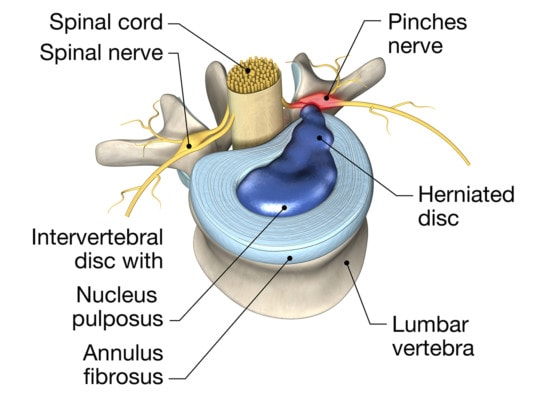How to Avoid Surgery and Steroids for a Slipped Disc
If you see an orthopedic physician or orthopedic surgeon for back pain that turns out to be a slipped disc, the overwhelming chances are that you will be treated with steroids, and when that fails, surgery. But in the risk versus benefit equation that should govern all medical treatment, is that the best plan? Let’s dig in…
What Is a Slipped Disc Anyway?

Axel_Kock/Shutterstock
While the term slipped disc makes it sound like the disc (the puck-shaped cushions that live between the vertebral bones in the back) has completely slipped from its normal location between two vertebrae, this isn’t exactly what happens. A slipped disc is actually a herniated disc, meaning the inner gel (nucleus pulposus) slips through a break in the tough annular covering of the disc. A similar condition is a bulging disc, in which the disc fibers weaken and become stretched, but the annular covering remains intact, or doesn’t break open, and instead of slipping out, the gel creates a bulge in the disc.
A slipped disc or bulging disc can occur anywhere along the vertebral column, from the neck (cervical discs) to the lower back (lumbar discs). Due to the break in the covering, a herniated disc is certainly the more concerning of the two; however, in most cases both can be treated without steroids and without surgery. Let’s learn more about these two disc conditions and how to treat them.
Diagnosing a Bulging or Slipped Disc
One step to diagnosing a herniated or slipped disc is to have an MRI of the affected area of the back. If you have a herniated disc, you will see terminology on the report such as the following: disc herniation, herniated nucleus pulposus, herniated, disc extrusion, extrusion, extruded, sequestered fragment, sequestered, and free fragment.
An MRI should give a clear indication of whether you really do have a slipped disc or just a bulging disc. The terminology on an MRI report that indicates a bulging disc includes the following: disc bulge, broad-based disc bulge, bulging disc, bulging, protruded, and protrusion.
Why Surgery and Steroids Should Be Avoided for Herniated or Bulging Discs
Herniated or bulging discs can put pressure on and irritate surrounding nerves, causing pain at the area of irritation in the back or anywhere along the nerve branch, such as the knee. Surgery involves removing disc tissue to remove the pressure on the nerves; however, no matter how it’s accomplished, coblation, laser, scalpel, or any other surgical device, surgery for a disc issue often creates more problems than it solves. The video below provides an animation of this surgery…
With surgery, the back wall of that thick annular covering is removed, weakening that area of the disc, which can clearly lead to more issues down the road. In addition, unlike most other tissues in our body, our discs aren’t good self-healers, so while the tissue might grow back in other areas, this isn’t typically the case in the spine. Another problem surgery creates is it disrupts blood supply to the affected area of the disc, which can, again, create more adverse issues and cause long-term problems with that disc. You might see a laser surgery touted as a better surgical solution, but laser, scalpel, or otherwise, anything that involves lopping off parts of the disc will still weaken the disc.
Epidural steroid injections should also be avoided for slipped discs and other disc issues as they not only lose their effectiveness over time but also are riddled with dangerous and toxic side effects, such as spinal fracture risks, cartilage loss, and adrenal issues. To eliminate the effects of these toxic epidural steroids, and do so nonsurgically, there are regenerative solutions for bulging and slipped discs.
Nonsurgical Solutions for a Bulging or Slipped Disc
Whether it’s a bulging or slipped disc, in most cases, it’s best to use a technology that doesn’t involve injecting the disc. Growth factors isolated from your own platelets (called platelet lysate) can be instilled around the nerve that has become irritated by the slipped disc. This allows your own body stimulate its own natural mechanisms to work on repairing your slipped disc.
The upshot? Because steroids and surgery will likely be offered, patients logically assume that they are the best solutions. However, neither steroids nor surgery is a good long-term solution to a slipped disc or other spinal problems. Steroids can cause serious problems, like spinal fractures, cartilage damage, and adrenal issues. Even worse, all surgery is damage to accomplish a goal, and in the case of spine surgery, the damage can create entirely new sets of problems. Seek the help of a interventional orthopedic physician, certified by the IOF in spinal procedures, for regenerative treatment that avoids both sets of problems, and get back to doing what you love!
Originally published on

NOTE: This blog post provides general information to help the reader better understand regenerative medicine, musculoskeletal health, and related subjects. All content provided in this blog, website, or any linked materials, including text, graphics, images, patient profiles, outcomes, and information, are not intended and should not be considered or used as a substitute for medical advice, diagnosis, or treatment. Please always consult with a professional and certified healthcare provider to discuss if a treatment is right for you.
